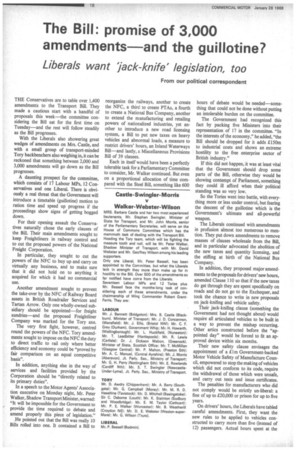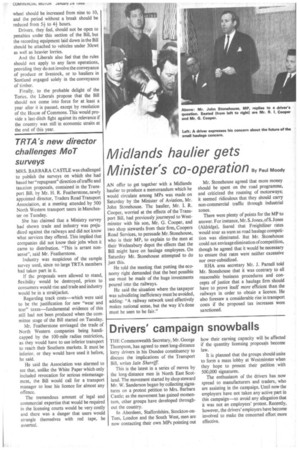The Bill: promise of 3,000 amendments and the guillotine?
Page 20

Page 21

If you've noticed an error in this article please click here to report it so we can fix it.
Liberals want jack-knife' legislation, too
From our political correspondent THE Conservatives are to table over 1,400 amendments to the Transport Bill. They made a cautious start with a handful of proposals this week—the committee considering the Bill sat for the first time on Tuesday—and the rest will follow steadily as the Bill progresses.
With the Liberals also showering great wedges of amendments on Mrs. Castle, and with a small group of transport-minded Tory backbenchers also weighing in, it can be reckoned that something between 2,000 and 3,000 amendments will go down as the Bill progresses.
A daunting prospect for the committee, which consists of 17 Labour MPs, 12 Conservatives and one Liberal. There is obviously a real threat that the Government will introduce a timetable (guillotine) motion to ration time and speed up progress if the proceedings show signs of getting bogged down.
For their opening assault the Conservatives naturally chose the early clauses of the Bill. Their main amendments sought to keep Freightliners in railway control and to cut the proposed powers of the National Freight Corporation.
In particular, they sought to cut the powers of the NFC to buy up and carry on virtually any business, and to make sure that it did not hold on to anything it acquired for which it had no commercial use.
Another amendment sought to prevent the take-over by the NFC of Railway Board assets in British Roadrailer Services and Tartan Arrow. Only one wholly-owned subsidiary should be appointed—for freight sundries—and the proposed Freightliner Company was marked for the Tory axe.
The very first fight, however, centred round the powers of the NFC. Tory amendments sought to impose on the NFC the duty to direct traffic to rail only where better efficiency and economy could be "proved by fair comparison on an equal competitive basis".
In addition, anything else in the way of services and facilities provided by the Corporation should be "directly related to its primary duties".
In a speech to the Motor Agents' Association executive on Monday night, Mr. Peter Walker, Shadow Transport Minister, warned: "It will be impossible for the Government to provide the time required to debate and amend properly this piece of legislation."
He pointed out that the Bill was really 10 Bills rolled into one. It contained a Bill to reorganize the railways, another to create the NFC, a third to create PTAs, a fourth to create a National Bus Company, another to extend the manufacturing and retailing powers of nationalized industries, yet another to introduce a new road licensing system, a Bill to put new taxes on heavy vehicles and abnormal loads, a measure to restrict drivers' hours, an Inland Waterways Bill—and lastly, a Miscellaneous Provisions Bill of 39 clauses.
Each in itself would have been a perfectly tolerable task for a Parliamentary Committee to consider, Mr. Walker continued. But even on a proportional allocation of time compared with the Steel Bill, something like 600 hours of debate would be needed—something that could not be done without putting an intolerable burden on the committee.
The Government had recognized this fact by packing five Ministers into their representation of 17 in the committee. "In the interests of the economy," he added, "the Bill should be dropped for it adds £150m to industrial costs and shows an extreme hostility to the free enterprise sector of British industry."
If this did not happen, it was at least vital that the Government should drop some parts of the Bill, otherwise they would be showing contempt of Parliament, something they could ill afford when their political standing was so very low.
So the Tories went into battle, with everything more or less under control, but fearing the descent of the guillotine which is the Government's ultimate and all-powerful weapon.
The Liberals continued with amendments in profusion almost too numerous to mention. They put down amendments to remove masses of clauses wholesale from the Bill, and in particular advocated the abolition of the new taxes and quantity licensing, and the stifling at birth of the National Bus Company.
In addition, they proposed major amend ments to the proposals for drivers' new hours, amended Clause 110 so that if the new taxes do get through they are spent specifically on roads and do not go to the Exchequer, and took the chance to write in new proposals on jack-knifing and vehicle safety.
Their jack-knifing clause (something the Government had not thought about) would require all articulated vehicles to be built in a way to prevent the mishap occurring. Other attics constructed before the "appointed day" would be forced to fit an approved device within six months.
Their new safety clause envisages the appointment of a £1m Government-backed Motor Vehicle Safety of Manufacture Council, empowered to stop the making of vehicles which did not conform to its code, require the withdrawal of those which were unsafe, and carry out tests and issue certificates.
The penalties for manufacturers who did not comply would be strictly un-liberal: a fine of up to £20,000 or prison for up to five years.
On drivers' hours, the Liberals have tabled careful amendments. First, they want the new rules to be applied to vehicles constructed to carry more than five (instead of 12) passengers. Actual hours spent at the wheel should be increased from nine to 10, and the period without a break should be reduced from 5+ to 4+ hours.
Drivers, they feel, should not be open to penalties under this section of the Bill, but the recording equipment laid down in the Bill should be attached to vehicles under 30ewt as well as heavier lorries.
And the Liberals also feel that the rules should not apply to any farm operations, providing they do not involve the conveyance of produce or livestock, or to hauliers in Scotland engaged solely in the conveyance of timber.
Finally, to the probable delight of the Tories, the Liberals propose that the Bill should not come into force for at least a year after it is passed, except by resolution of the House of Commons. This would provide a last-ditch fight against its relevance if the country was still in economic straits at the end of this year.












































































































